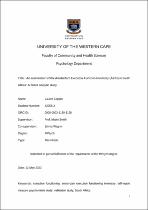| dc.contributor.advisor | Smith, Mario | |
| dc.contributor.author | Coppin, Lauren | |
| dc.date.accessioned | 2023-08-02T10:47:50Z | |
| dc.date.available | 2023-08-02T10:47:50Z | |
| dc.date.issued | 2023 | |
| dc.identifier.uri | http://hdl.handle.net/11394/10429 | |
| dc.description | Magister Psychologiae - MPsych | en_US |
| dc.description.abstract | Executive functioning has a significant role in human behaviour and development. It is important for an individual’s everyday functioning and skill set. Thus, over the years executive functioning has become a prominent construct among researchers, practitioners and in literature. This popularity has resulted in challenges establishing comparable estimates of psychometric properties. Executive functioning is typically measured by performance-based measures however, recently there is emerging support for the use of self-report measures. In developing countries such as South Africa, research on executive functioning will receive a substantial injection if self-reports were found to be reliable and valid alternatives to costly and inaccessible performance-based measures. The Amsterdam Executive Function Inventory (AEFI), a measure of executive functioning, has been used recently in South Africa with good reliability and internal stability reported as evidenced by acceptable Cronbach alphas. | en_US |
| dc.language.iso | en | en_US |
| dc.publisher | University of the Western Cape | en_US |
| dc.subject | Executive functioning | en_US |
| dc.subject | Amsterdam executive functioning inventory | en_US |
| dc.subject | Self-report measure | en_US |
| dc.subject | Psychometric study | en_US |
| dc.subject | Validation study | en_US |
| dc.title | An examination of the Amsterdam executive function inventory (AEFI) in South Africa: A factor analytic study | en_US |
| dc.rights.holder | University of the Western Cape | en_US |

